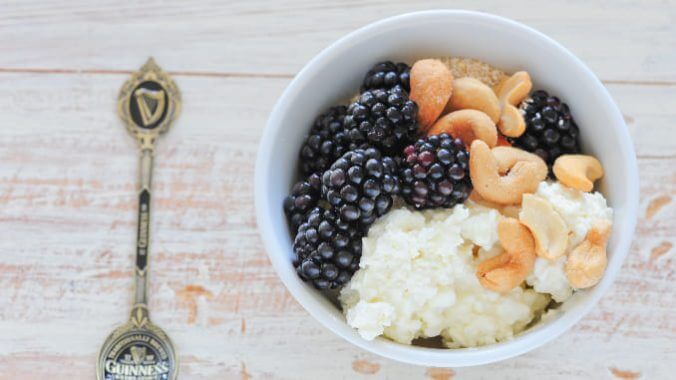Lumpy. Slimy. Yogurt but worse. These were all words I used to describe cottage cheese at one point in my life. If you asked me how I felt about the ingredient, I would have delivered a scathing condemnation, a brutal takedown of a food I saw as a curse to all things creamy—that is, if I even thought of it at all. Until recently, I had nearly completely forgot cottage cheese even existed. It seemed like a food lost to the ‘90s, like SlimFast and Bagel Bites.
But unlike all those packaged diet foods of the era, cottage cheese was not a highly packaged monstrosity packed full of fake sugar to make up for its obvious lack of fat. Rather, it’s real cheese, a curdled milk product, that provides a blank canvas for anything else you choose to eat with it. As a child, the nothingness of the flavor of cream cheese was made more offensive by the noticeable texture—the little cheese curds floating in the watery bath of their own creation felt like spoiled milk. But there were a lot of foods I was sensitive to as a kid. Olives, asparagus, beans of any variety: They became bearable, even enjoyable, as I grew older. Why did I leave cottage cheese behind?
For me, the hatred of cottage cheese stems from diet culture and my association with the ingredient as nothing more than a diet food. I remember the women in my life with their Weight Watchers cards during my childhood, carefully tallying their allotted calories for the day. Cottage cheese was a favorite due to its low calorie content. Though I never participated in these diets myself (I did not have an “almond mom,” thank god), I can imagine that after restricting yourself so much over the course of the day, being able to indulge in something, anything—even cottage cheese—must have been a relief. It was one of the few foods you could eat in bulk without worrying about the “consequences.”
That being said, I don’t think I ever saw someone eat cottage cheese for the pleasure of the experience. In my mind, it was always framed as a food you should eat, not one that anyone should be excited about. It was meant to be tolerated, not savored. So, in my own rejection of diet culture, I saw no need to ever stock my fridge with the stuff.
I felt the same way about salads for a while, lamenting the undressed kale concoctions peddled by raw vegan YouTubers in the mid-2010s. But then I learned that salads, when prepared with care and consideration, can come in all forms, some cooked and crispy with plenty of fried components, others salty and umami and bursting with acidity. I stopped seeing salad as a sad albeit healthy choice. It ceased to be about health at all—salad returned to its neutral status, finally free to be itself without contending with the confines of diet culture.
But for many of us, cottage cheese has not yet recovered from its diet culture-induced reputation. About a year ago, I decided to try it again on a whim, turned off though I was by its lumpy texture as soon as I opened its plastic container. You can imagine my surprise, then, when I discovered that cottage cheese actually isn’t bad. In fact, quite the opposite: I loved it. Combined with some chopped cucumber, fresh dill, olive oil and black pepper, it came together as a delightful breakfast salad. Upon more experimentation, I discovered that this neutral ingredient pairs well with a long list of other food items: smoked salmon, onions, canned fruit, fresh berries… the list is never-ending.
There’s nothing wrong with attempting to be healthier, to feed ourselves better food so we can feel our best. If that’s what you’re going for, cottage cheese, with its surprisingly high protein content, is undoubtedly a decent choice for many. But an obsession with thinness is not about health—it’s about maintaining a beauty standard that upholds racist and sexist ideologies, that functions to exert control over bodies that do not fit the prescribed mold. It’s no wonder that the low-fat fad foods of the ‘90s are so unappealing now: Some of them tasted bad, sure, but all of them were tinged with this toxic body hierarchy that very few of us have materially benefitted from.
But hear me out: Cottage cheese is a victim of this mindset just as much as we were. It does not deserve to be relegated to the annals of culinary history, preserved in the Jell-O molds of our grandmothers’ heydays. It’s time for cottage cheese to come into the light and for us to accept it with open arms, embracing its weird lumps just as we try to embrace our own.
Samantha Maxwell is a food writer and editor based in Boston. Follow her on Twitter at @samseating.
